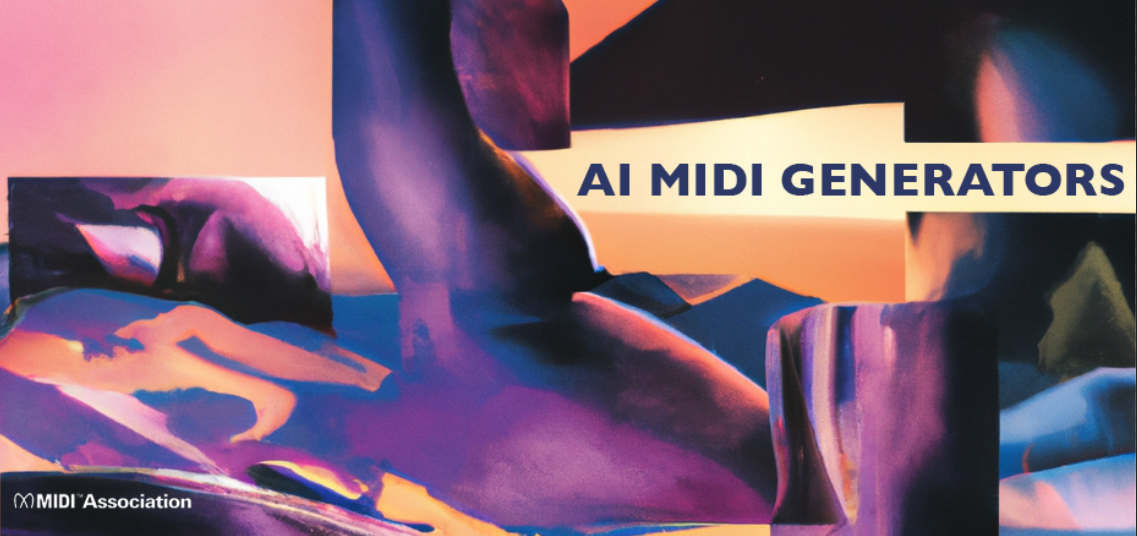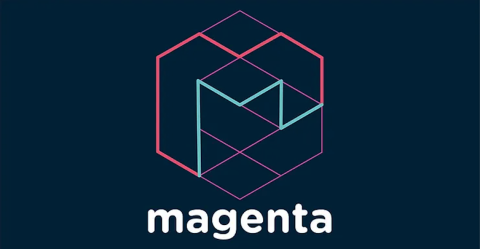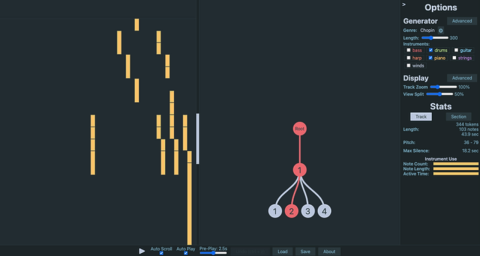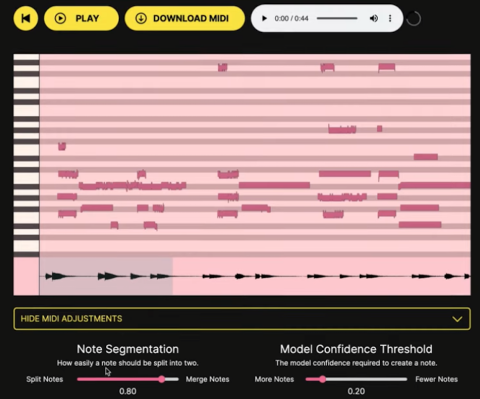3 Best AI Music Generators for MIDI Creation

A new generation of AI MIDI software has emerged over the past 5 years. Google, OpenAI, and Spotify have each published a free MIDI application powered by machine learning and artificial intelligence.
The MIDI Association reported on innovations in this space previously. Google’s AI Duet, their Music Transformer, and Massive Technology’s AR Pianist all rely on MIDI to function properly. We’re beginning to see the emergence of browser and plugin applications linked to cloud services, running frameworks like PyTorch and TensorFlow.
In this article we’ll cover three important AI MIDI tools – Google Magenta Studio, OpenAI’s MuseNet, and Spotify’s Basic Pitch MIDI converter.
Google Magenta Studio
Google Magenta is a hub for music and artificial intelligence today. Anyone who uses a DAW and enjoys new plugins should check out the free Magenta Studio suite. It includes five applications. Here’s a quick overview of how they work:
- Continue – Continue lets users upload a MIDI file and leverage Magenta’s music transformer to extend the music with new sounds. Keep your temperature setting close to 1.0-1.2, so that your MIDI output sounds similar to the original input but with variations.
- Drumify – Drumify creates grooves based on the MIDI file you upload. They recommend uploading a single instrumental melody at a time, to get the best results. For example, upload a bass line and it will try to produce a drum beat that compliments it, in MIDI format.
- Generate – Maybe the closest tool in the collection to a ‘random note generator’, Generate uses a Variational Autoencoder (MusicVAE) and has trained on millions of melodies and rhythms within its dataset.
- Groove – This nifty tool takes a MIDI drum track and uses Magenta to modify the rhythm slightly, giving it a more human feel. So if your music was overly quantized or had been performed sloppily, Groove could be a helpful tool.
- Interpolate – This app asks you for two separate MIDI melody tracks. When you hit generate, Magenta composes a melody that bridges them together.
The Magenta team is also responsible for Tone Transfer, an application that transforms audio from one instrument to another. It’s not a MIDI tool, but you can use it in your DAW alongside Magenta Studio.
OpenAI MuseNet
OpenAI is a major player in the AI MIDI generator space. Their Dalle 2 web application took the world by storm this year, creating stunningly realistic artwork and photographs in any style. But what you might not know is that they’ve created two major music applications, MuseNet and Jukebox.
- MuseNet – MuseNet is comparable to Google’s Continue, taking in MIDI files and generating new ones. But users can constrain the MIDI output to parameters like genre and artist, introducing a new layer of customization to the process.
- MuseTree – If you’re going to experiment with MuseNet, I recommend using this open source project MuseTree instead of their demo website. It’s a better interface and you’ll be able to create better AI music workflows at scale.
- Jukebox – Published roughly a year after MuseNet, Jukebox focuses on generating audio files based on a set of constraints like genre and artist. The output is strange, to say the least. It does kind of work, but in other ways it doesn’t. The application can also be tricky to operate, requiring a Google Colab account and some patience troubleshooting the code when it doesn’t run as expected.
Spotify Basic Pitch (Audio-to-MIDI)
Spotify is the third major contender in this AI music generator space. A decade ago, in 2013, they published a mobile-friendly music creation app called Soundtrap. So they’re no stranger to music production tools. As for machine learning, there’s already a publicly available Spotify AI toolset that powers their recommendation engine.
Basic Pitch is a free browser tool that lets you upload any song as an audio file and convert it into MIDI. Basic pitch leverages machine learning to analyze the audio and predict how it should be represented in MIDI. Prepare to do some cleanup, especially if there’s more than one instrument in the audio.
Spotify hasn’t published a MIDI generator like MuseNet or Magenta Studio’s Continue. But in some ways Basic Pitch is even more helpful, because it generates MIDI you can use right away, for a practical purpose. Learn your favorite music quickly!
The Future of AI MIDI Generators
The consumer applications we’ve mentioned, like Magenta Studio, MuseTree, and Basic Pitch, will give you a sense of their current capabilities and limitations. For example, Magenta Studio and MuseTree work best when they are fed special types of musical input, like arpeggios or pentatonic blues melodies.
Product demos often focus on the best use cases, but as you push these AI MIDI generators to their limits, the output becomes less coherent. That being said, there’s a clear precedent for future innovation and the race is on, amongst these big tech companies, to compete and innovate in the space.
Private companies, like AIVA and Soundful, are also offering AI music generation for licensing. Their user-friendly interfaces are built for social media content creators that want to license music at a lower cost. Users create an account, choose a genre, generate audio, and then download the original music for their projects.
Large digital content libraries have been acquiring AI music generator startups in recent years. Apple bought up a London company called AI Music in February 2022, while ShutterStock purchased Amper Sounds in 2020. This suggests a large upcoming shift in how licensed music is created and distributed.
At the periphery of these developments, we’re beginning to see robotics teams that have successfully integrated AI music generators into singing, instrument-playing, animatronic AI music robots like Shimon and Kuka. Built by the Center for Music Technology at Georgia Tech, Shimon has performed live with jazz groups and can improvise original solos thanks to the power of artificial intelligence.
Stay tuned for future articles, with updates on this evolving software and robotics ecosystem.


